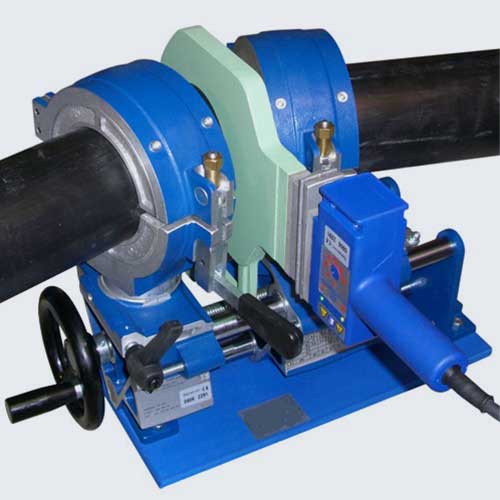Butt Fusion Welding
Butt fusion welding is the name given to hot plate welding of thermoplastic pipes. It is one of two main techniques for the fusion joining of polyethylene (HDPE) and polypropylene (PP) pipe..
THE PROCESS
The Butt welding method is the most common welding method currently used for joining HDPE and PP pipes in a continuous run or attaching fittings to them. The pipe joining method is a process in which the two ends of the pipes are heated and welded by using a butt welding machine. Both ends of the join are pushed against each other at a specific pressure once the required temperature is reached.
The heating phase, sometimes referred to as ‘bead up’, is where the pipe ends are pressed against a heated plate for a period of time. This is followed by the ‘heat soak’ phase where the pressure is reduced to just hold the pipe ends on the hot plate. This allows time for the heat to soak into the material at the pipe ends.
After the heat soak phase, the hot plate is removed and the pipe ends brought together. The time taken to do this is called ‘dwell time’ and needs to be as short as possible. The final phase is the welding/cooling time, predetermined subject to pipe diameter and wall thickness.

ADVANTAGES
- HDPE & PP pipe’s fused joints do not leak, eliminating infiltration and inflow problems experienced with alternate pipe joints, use the butt fusion welding machine to weld.
- HDPE & PP pipe can be heat fused together to form a joint that is as strong or stronger than the pipe itself and is leak-free. This eliminates the potential leak points every 10-20 feet as found with PVC and Ductile Iron bell-and-spigot connections.
- The Life Cycle Cost of HDPE & PP pipe differs from other pipe materials because the “allowable water leakage” is zero rather than typical leakage rates of 10 to 20% for PVC and Ductile Iron.
- HDPE & PP pipe fused joints are self-restraining and do not require costly thrust restraints or thrust blocks.
- PP has a high resistance to cracking, acids, organic solvents and electrolytes.
- PE is highly resistant to the wet, hydrogen sulfide gas and the low concentration acid found in a sanitary sewer.
- PE & PP pipe will not corrode, tuberculate or support biological growth

Call Us Anytime: +27 84 444 5525
Send us an Email: info@thermoweld.co.za
Address: Unit 11 Austerville Factories, Maryhill Road, Jacobs
